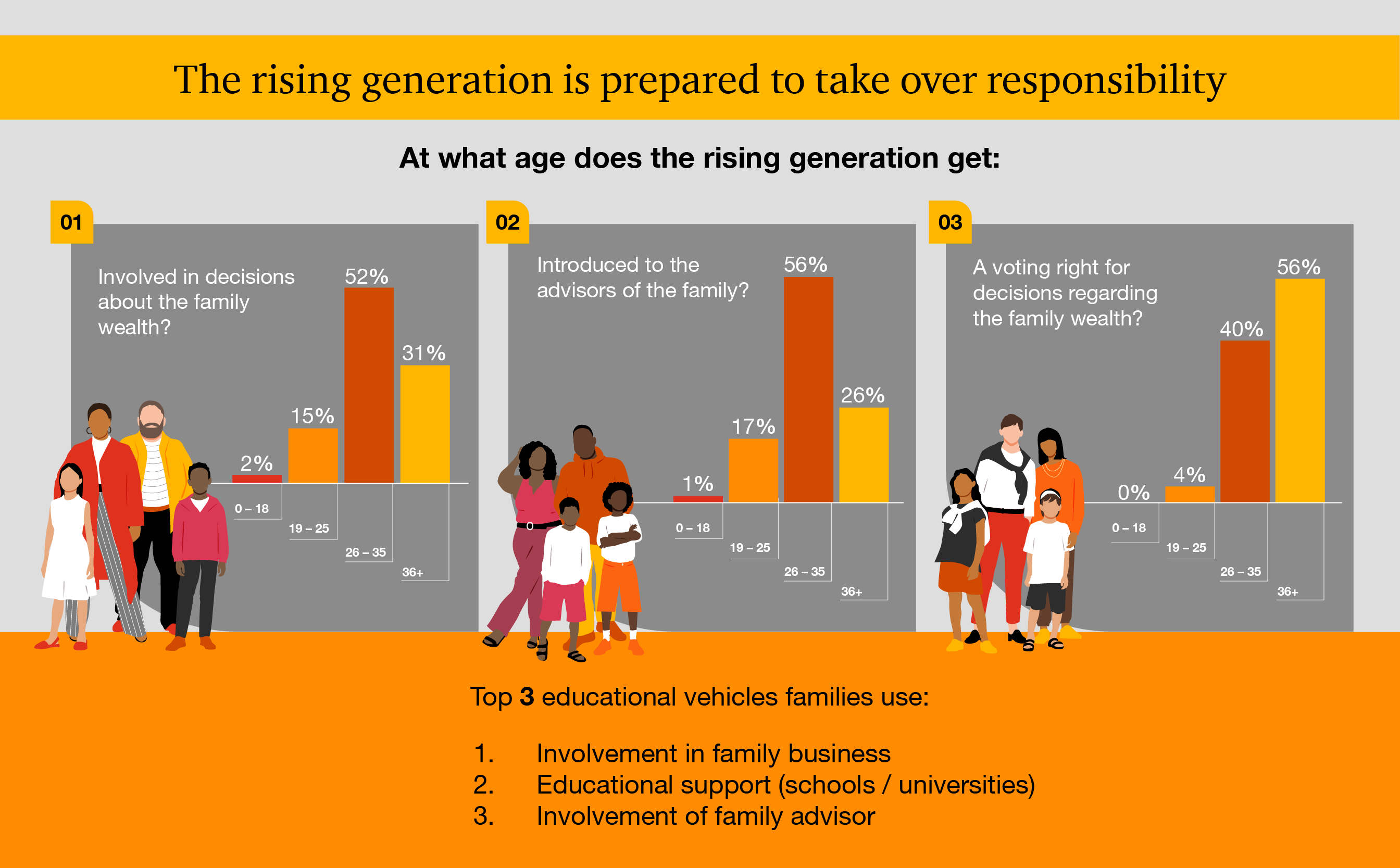{{item.title}}
{{item.text}}

{{item.title}}
{{item.text}}
In our previous blog posts, we explored the most commonly discussed topics by families in the Family Barometer 2023 report. We found that many families are facing significant cross border challenges which directly impact their tax and regulation compliance.
Additionally, the Family Barometer 2023 report touches on Family governance; a system of collective decision-making. Families grow and more people want to have a seat around the table, family governance becomes more and more important. Open communication is paramount for the survival of the business and discussions around a family constitution, family values, education, succession and purpose should be elicited well in advance. This will ensure that the difficult discussions take place while “everyone still loves each other” and will enable the family to navigate the cultural and generational gaps that have expanded wider than ever before.
Succession also plays an enormous role in the family governance sphere. Succession tends to be a more emotional process within family businesses than in corporations. This is due to the personal attachment that the founder may have to his role at the helm of the business, the children’s perception of taking over from their mother or father’s role, and the reluctance of family members to sometimes accept an outsider as the best candidate for the role.
Furthermore, David Durlacher, CEO of Julius Baer Ltd, highlights that “the fundamental objective for both clients and their wealth manager is to understand the purpose of wealth. It’s important that successors understand they are not only inheriting wealth but also a shared family purpose and legacy. Fully understanding what the wealth stands for will also help sustain it.”
Thus, grooming the NextGen for their roles from a young age can ease the pressure of finding a successor. As highlighted in the report, families are taking steps to expose their children to the business from a young age.“More than half (52%) of the professionals taking part in the survey say that families start to involve the young in decisions about managing wealth between the ages of 26 and 35. A similar proportion (56%) introduce them to advisors at the same age. But families wait longer before involving them in important decisions or giving them voting rights: more than half (56%) of the respondents report that families wait until their children are over 35. That said, the children do not always have to wait so long, as four in ten respondents note that families give children a say between 26 and 35.”
Education is key to preparing the NextGen to take over the family business and ensure lasting success. As illustrated in the chart above, there are three fundamental learning vehicles: involvement in the family business, education and talking to the family advisor. This focus on education is nothing new with many families taking on a systematic approach to preparing the NextGen, including encouraging them to join the family business from a young age, or even work for friends’ or competitors’ businesses.
The Family Barometer 2023 report also considers how Political stability influences a family’s decision-making. This topic speaks for itself as political polarisation and rising nationalism have created uncertainty across the globe. Wealthy families are taking into consideration political stability and geopolitics more than before – not only in their investment decisions, but also in how they structure their overall wealth. This can mean refraining from investing in places where they believe the geopolitical situation might lead to added complexity and loss of assets.
“The world will continue to experience more frequent, more severe and more impactful short-term crises. Addressing these challenges is no longer just the purview of governments; rather, they will require everyone – every government, business and individual – to do what they can to help mitigate the impacts of short-term crises. At the same time, the challenges experienced in South Africa offer an opportunity for private companies to rebuild their value and make a societal impact. A purpose-led strategy must be at the core of these responses.”
The Family Barometer 2023 report uncovers the globalised nature of family affairs, the changing landscape of taxes and regulations, the role of family governance, the impact of political stability, and the dynamics of philanthropy. These valuable findings bring light to the importance of long-term planning, and the challenges of navigating family wealth. However, with the guidance from experts, navigating these challenges and finding new opportunities can become simpler.
From the family businesses that have proven that they can last for generations; it is clear that families can stand together and build a legacy in the face of adversity. Putting the correct measures in place is, however, of utmost importance. Succession planning, upskilling and education, and the professionalising of families and businesses are, but a few of the discussions that will have to be held at the family table.
Should you want to start the conversation, please feel free to reach out to us. Our team is globally based and can assist across borders.

